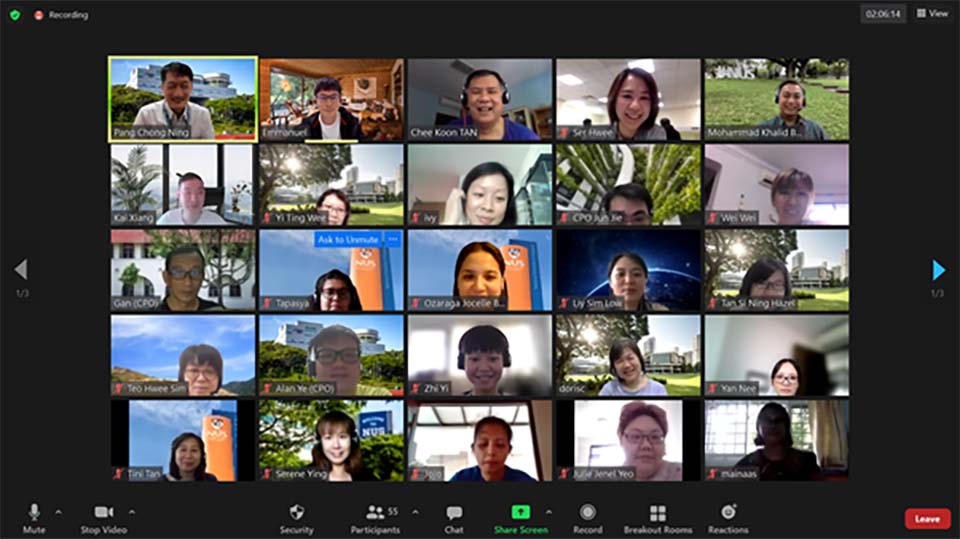Timely reviews and continuous improvement are imperative to ensure procurement in University remains a strategic function. With this in mind, the Central Procurement Office (CPO) embarked on an important mission and set up a taskforce to engage key stakeholders to find out the challenges they face. Over 200 pain points were discovered. From here, CPO decides to embark on a procurement reform journey where all the policies and processes will be relooked into, and to replace the existing system with a new one to capture all processes from end to end.
More than 570 participants from various units across campus attended 60 hours of Business Process Re-engineering workshops and socialisation sessions. These sessions resulted in the redesigning of workflows which aims to support the improvement of procurement processes and to provide a blueprint for the new digital procurement system.
 Socialisation with CPO Business Partners and Shared Services on Zoom
Socialisation with CPO Business Partners and Shared Services on Zoom
“We planned for several rounds of socialisation before we formalised the proposed solutions that increased the efficiency of the different processes for GGS and BCGS procurement. It was important to the team that the proposed workflows were shared with the various stakeholders so that they have an opportunity to review the solutions,” said Koh Ser Hwee, Senior Manager from OETU.
The new system will include new and improved features such as: an expanded catalogue with more items to search and purchase from, procure to pay, source to contract, supplier management and e-invoice automation. Analytical capabilities will provide up-to-date critical dashboard information as well as data analysis and trend forecast.
 List of activities engaged under Procurement Reform 2.0
List of activities engaged under Procurement Reform 2.0
Another bugbear raised was the inability to distinguish between the purchase of General, Goods and Services (GGS) and Building & Construction Goods and Services (BCGS). Purchasers were confused with the different procurement guidelines and processes of GGS and BCGS, which are administered by CPO and University Campus Infrastructure respectively. The introduction of Policy Reform 2.0, which merges and consolidates both procurement policies, provided more ease and clarity.
Policy Reform 2.0 is distinctive for its extensive engagement with stakeholders. While the policy is undergoing approval, the Policy Reform 2.0 team will revisit policies to ensure that the voices of stakeholders are heard as they work towards a successful launch in the first quarter of 2022.
The second phase of the procurement reform project will focus on the execution of the revised University Procurement Policy and Procurement Procedural Guidelines, as well as the implementation of the Digital Procurement System (DPS). According to Chief Procurement Officer Pang Chong Ning, Sun Tze’s The Art of War serves as the source of inspiration to manage this process – “Engage people with what they expect; it is what they can discern and confirm their projections. It settles them into predictable patterns of response, occupying their minds while you wait for the extraordinary moment — that which they cannot anticipate.” Changes must be introduced gradually, with an awareness of potential obstacles for effective changes to be made to the existing system.
Organisational Excellence is a strategic initiative undertaken by the University to develop best practices for an efficient and world-class administration to better support NUS’ Vision and Mission. It aims to bring about improved work processes and policies as well as create opportunities for talent development and growth.